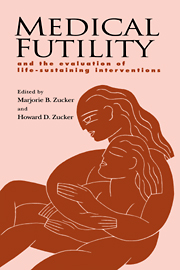Book contents
- Frontmatter
- Contents
- Preface
- Foreword
- Contributors
- 1 Medical futility: a useful concept?
- 2 Death with dignity?
- 3 Physicians and medical futility: experience in the critical care setting
- 4 Physicians and medical futility: experience in the setting of general medical care
- 5 Futility issues in pediatrics
- 6 Medical futility: a nursing home perspective
- 7 Alternative medicine and medical futility
- 8 How culture and religion affect attitudes toward medical futility
- 9 When religious beliefs and medical judgments conflict: civic polity and the social good
- 10 Conflict resolution: experience of consultation-liaison psychiatrists
- 11 Ethics committees and end-of-life decision making
- 12 The economics of futile interventions
- 13 Medical futility: a legal perspective
- 14 Professional and public community projects for developing medical futility guidelines
- 15 Community futility policies: the illusion of consensus?
- 16 Not quite the last word: scenarios and solutions
- Index of cited authors, cases, and statutes
- Subject index
6 - Medical futility: a nursing home perspective
Published online by Cambridge University Press: 11 September 2009
- Frontmatter
- Contents
- Preface
- Foreword
- Contributors
- 1 Medical futility: a useful concept?
- 2 Death with dignity?
- 3 Physicians and medical futility: experience in the critical care setting
- 4 Physicians and medical futility: experience in the setting of general medical care
- 5 Futility issues in pediatrics
- 6 Medical futility: a nursing home perspective
- 7 Alternative medicine and medical futility
- 8 How culture and religion affect attitudes toward medical futility
- 9 When religious beliefs and medical judgments conflict: civic polity and the social good
- 10 Conflict resolution: experience of consultation-liaison psychiatrists
- 11 Ethics committees and end-of-life decision making
- 12 The economics of futile interventions
- 13 Medical futility: a legal perspective
- 14 Professional and public community projects for developing medical futility guidelines
- 15 Community futility policies: the illusion of consensus?
- 16 Not quite the last word: scenarios and solutions
- Index of cited authors, cases, and statutes
- Subject index
Summary
“The term medical futility has become a shorthand way to describe a situation in which the patient demands and the physician objects to the provision of certain medical treatment on the ground that the treatment will provide no medical benefit to the patient” (Daar 1995:221). The debate on the issue of medical futility has focused primarily on the care and treatment provided in the acute care setting. But questions about how medical futility decisions are reached also have profound implications for nursing homes, the institutions created to care for the oldest and most vulnerable of our society.
Discussion of what may be considered medically futile treatment goes to the heart of what it means to provide care and treatment for the dependent elderly, how we define and value life, and how we view the role of medical technology. These considerations define the role of the nursing home as a care-giving institution. How do we as a society create the kind of environment that will allow us to number our days in comfort and dignity while dealing with the difficult decisions that medical technology has foisted upon us? A number of factors may influence the manner in which the issue of medical futility is explored and resolved in the nursing home.
The role of nursing homes
As institutions, nursing homes are challenged to both care and cure.
- Type
- Chapter
- Information
- Medical FutilityAnd the Evaluation of Life-Sustaining Interventions, pp. 58 - 64Publisher: Cambridge University PressPrint publication year: 1997

